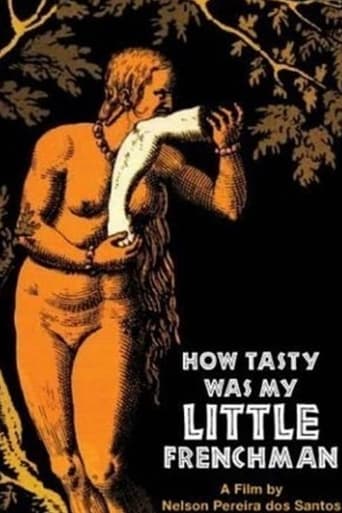MartinHafer
This film is the story of a Frenchman who was captured by natives in Brazil who thought he was Portuguese. This was a serious problem, as the tribe HATED the Portuguese and planned on eating him. However, instead of eating the guy right away, he was allowed to live among them for several months--and the film is about this in between time. However, the end does come and they DO kill and eat him."How Tasty Was My Little Frenchman" sure looked like a comedy based on the description from Netflix. And, the introductory portion was, at times, funny (as what happened and what the narrator said were NOT one in the same). But as for the rest of the movie, I could see nothing that was remotely funny. Now I am not saying the film is without merit --it just wasn't close to what I expected. I should note that in addition to being a completely unfunny film, it may well shock you with its depictions of full frontal nudity. Now this DID make sense, as these native tribes did NOT run around in loin cloths--hence the film would be interesting to historians, anthropologists and the like. But, as I said, it probably will be a bit of a shock seeing all these shaved genitals (as well as shaved eyebrows). And, sadly the story just isn't that interesting--and I kept expecting SOMETHING to happen that would make the viewing experience worth my time but didn't. Technically, it's well made but why make a dreary film like this?! If you are expecting a film like "Eating Raoul", keep looking...
jzappa
I was hardly aware of the time in history depicted in this 1971 Brazilian black comedy, however that is not to say it wasn't accessible to me because the movie makes it very clear. It's set in 16th century Brazil, where rival French and Portuguese settlers are exploiting the indigineous people as confederates in their battle to assert dominance. What is particularly interesting about the movie is that it is made by the Portuguese from the point of view of the French. The hero is a likable Frenchman, the Portuguese are barbarians, and the rest of the French are oppressive and greedy. The film's Portuguese makers are objective because when all is said and done, we see that it makes no difference whose side one takes. It's about heredity overpowered by environment in a time starkly defined by tribes. Enemies are made and perpetuated, and like so, the environmental integration never progresses.A Frenchman is captured by the Portuguese is then captured by an indigenous tribe, the Tupinambas, after they massacre a group of Portuguese. The tribe's shaman predicted they would find a strong Portuguese man to cannibalize as revenge for the chief's brother being killed by a Portugeuse musket ball. Thinking the Frenchman is Portuguese, they believe they now have one. Nevertheless, the Frenchman is granted unrestrained course of the village, is sooner or later given a wife, and assumes their accustomed appearance rather than his Western clothes, or any clothes. Another Frenchman comes to the village and tells the tribe that their prisoner is indeed Portuguese, then assures the incensed Frenchman that he will tell them the truth when the Frenchman finds a secret treasure trove that another European has hidden nearby.I found the opening scene funny, because its narration apposed with its contradictions on- screen serve as great satire, even if the movie didn't seem to want to maintain that tone very much more often. It's actually not a terribly riveting film. The bountiful, essential locale, fierce way of life and ripened native women make not only the Frenchman, but us, too, forget any threat, and we have the feeling of him as a free man. It should not be that terribly hard to escape. The cannibalism is as scarce of desire as the full-frontal nudity of the cast, suggested in lieu as the representative core of Pereira dos Santos's dry political cartoon of New World mythology and undeveloped social coherence. At any rate, this 1500s-era social commentary, shot on location at a bay with 365 islands, played almost entirely nude and almost entirely written in Tupi, encourages effective breakdown of established ways which are topical because they've repeated themselves for centuries.
lcrews
How Tasty Was My Little Frenchman tells a story that is alternately sad, scary and life-affirming. It ends with a brutal finale that you knew had to happen, even though you were hoping--maybe even beleiving--it wouldn't. Utlimately, this is the film's greatest strength: it expertly plays with your emotions and expectations, then drops a bomb on you. I saw this in a film theory class at USC back in the mid-'90s. It is not easy to find, but is definitely worth hunting for.
raybea
Why have I never heard of this remarkable film before? It is totally riveting, engrossing. A Frenchman is captured by an Indian tribe in coastal Brazil not so long after Columbus discovered the New World. He is taken as a slave into the village, given a beautiful girl (widow of a warrior he had killed) as his wife, and told that in eight months they will eat him.The growth of his relationship with the tribe and his native bride, and his acceptance of their ways - while still desperately searching for ways to escape - are spellbinding. This is authentically done, so no-one in the movie wears much more than a string of beads. But you quickly realise how superficial clothes are, and before long you cease noticing that no-one is wearing any. As for the climax - oh boy....
